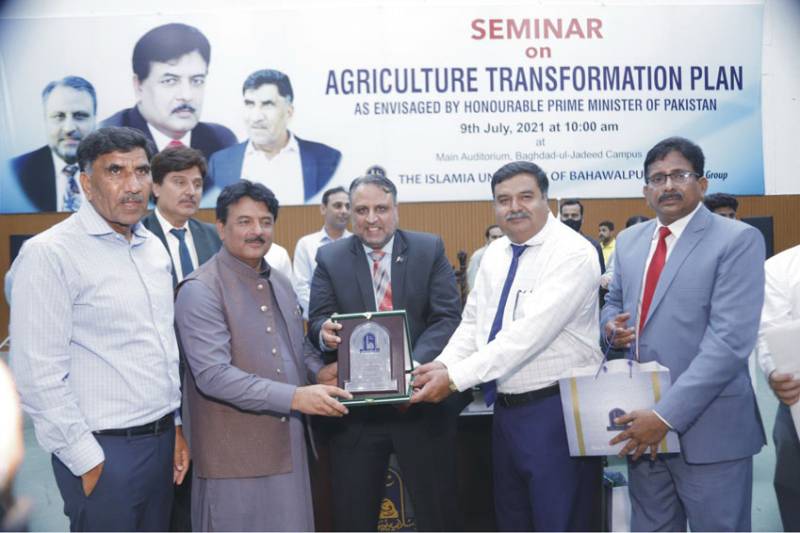BAHAWALPUR - Special Assistant to the Prime Minister for Food Security Jamshed Iqbal Cheema has said that the program “Agriculture Transformation Plan” as envisaged by the Honourable Prime Minister of Pakistan is in fact a program of economic and social emancipation of the farmers. The goal of this program is self-sufficiency in food and eradication of poverty. He said that the Federal government would give loans to youth for food processing to cater food needs of the country. He was addressing a seminar titled, “Agriculture Transformation Plan, a Vision of Prime Minister” at Islamia University Bahawalpur (IUB) here. He said that the Prime Minister’s program of changing Pakistan from agriculture to food sufficient country basically consists of three parts. The first part is to save water, the second part is to increase the agricultural area and the third part is to increase the production of fruits and vegetables.
He termed the Prime Minister’s Agriculture Development Program as consisting of food, wheat and fiber. He said that 138 million acre feet of water was currently available in Pakistan, out of which only 13 million acres feet was being used. According to the Prime Minister’s plan, water use will be increased to 26 million acre feet and storage capacity will be created accordingly. A total of 220 million acres of land is available for cultivation in Pakistan out of which only 55 million acres are being used for agriculture which will be gradually increased. Similarly, the population of Pakistan is suffering from malnutrition, so the production of vegetables and fruits will be brought on par with the production of grains and wheat. “Our priorities are livestock, fruit and vegetable production, restoration of the cotton crop, grain production and encouraging the cultivation of sugar beet instead of sugarcane,” he said.
He told that agriculture and food security plan had started in a comprehensive manner. Thousands of acres of land have become arable in Balochistan, Khyber Pakhtunkhwa and the former FATA. In areas of the former FATA where people have been fighting terrorism for decades, they are now growing olives and other crops in connection with agriculture. With the help of solar technology, areas of former FATA, Khyber Pakhtunkhwa and Balochistan are being irrigated and settled. He said that the Prime Minister felt the need for future food requirements in view of the growing population.
He often mentions malnutrition because by international standards, our people are 38% malnourished. It is an agricultural country but wheat is still being imported. The government is focusing on food self-sufficiency as well as textile exports. After 7 years, exports in the textile sector reached to 3 billion, which will be gradually increased to 20 billion and 26 billion US dollars. The government has increased the textile subsidy from Rs66 billion to Rs115 billion. Electricity and gas have been made cheaper for the textile industry and imports of machinery are being promoted. The food processing sector is very important. He said that agricultural research in Islamia University Bahawalpur was commendable. Vice Chancellor Engr. Prof. Dr. Athar Mahboob is taking special interest in research activities at the University.
The university has senior experts like Prof. Dr. Muhammad Iqbal Bandesha and emerging agricultural scientists like Dr. Muhammad Ali Raza. He said that an institution like a university has its own sanctity. The university should introduce its brand of cotton, honey and olives produced in agricultural research to the market. He said that Pothohar region was being turned into a honey valley and 10,000 tonnes of honey was being produced from Margalla hills alone. 4.1 million Olive trees have been planted in ex-FATA areas. There are practical examples for university experts and they should lead and lead the entire country in the field of research. Encouraging the number of female faculty and students present at the event, she said that the role of women in the country’s labor force was very important and they could play an active role in all walks of life.






